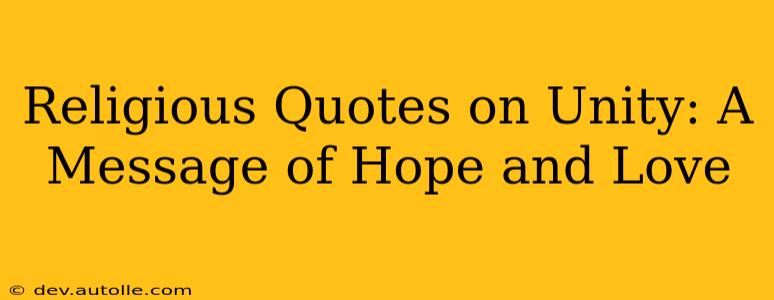Religious traditions across the globe emphasize the importance of unity, offering powerful messages of hope, love, and interconnectedness. These messages transcend denominational boundaries, echoing a universal call for peace and understanding. Exploring these quotes provides a profound insight into the spiritual foundations of unity and its vital role in fostering a more harmonious world. This exploration will delve into various faiths and highlight the common threads weaving through their teachings on unity.
What are some examples of religious quotes about unity?
Numerous religious texts and teachings contain powerful statements about unity. Here are a few examples spanning different faiths:
-
Christianity: "A new command I give you: Love one another. As I have loved you, so you must love one another." (John 13:34, NIV). This quote emphasizes the unifying power of love as the cornerstone of Christian fellowship and underscores the importance of selfless devotion. The concept of the "body of Christ," where individual believers form a single, interconnected entity, further highlights this theme of unity.
-
Islam: "Hold fast to the rope of Allah all together and do not become divided." (Quran 3:103). This verse highlights the importance of communal solidarity and adherence to Islamic principles as a means to achieve unity and avoid discord. The emphasis on the "rope of Allah" symbolizes the shared faith and its unifying power.
-
Buddhism: "The essence of all religions is to make good people better." While not a direct quote from a specific Buddhist scripture, this sentiment reflects the inclusive nature of Buddhist philosophy. It emphasizes the common ground shared by all faiths in their pursuit of ethical conduct and spiritual development, facilitating unity among people of different religious backgrounds.
-
Hinduism: The concept of "Vasudhaiva Kutumbakam," meaning "the world is one family," is a central tenet of Hindu philosophy. This emphasizes the interconnectedness of all beings and the importance of treating each other with compassion and respect. This underscores the inherent unity of humanity within a larger cosmic family.
-
Judaism: "Love thy neighbor as thyself" (Leviticus 19:18). This quote, similar to the Christian message of love, emphasizes the importance of mutual respect, compassion, and empathy as cornerstones of unity within the community and beyond. It promotes a sense of shared humanity and responsibility.
How can religious unity be achieved?
Achieving religious unity requires a multifaceted approach emphasizing understanding, respect, and dialogue:
-
Interfaith Dialogue: Open and respectful conversations between people of different faiths are crucial to break down stereotypes, foster understanding, and identify common values. This requires active listening, empathy, and a willingness to learn from each other.
-
Focus on Shared Values: Emphasizing shared ethical principles, such as compassion, justice, and peace, can bridge religious divides and build a foundation for collaboration.
-
Education and Awareness: Educating ourselves and others about different faiths can help dispel misconceptions and promote tolerance. This includes learning about the history, beliefs, and practices of various religions.
-
Celebrating Diversity: Recognizing and celebrating the richness and diversity of religious traditions can foster mutual appreciation and respect. This includes participating in interfaith events and engaging in meaningful cross-cultural interactions.
What are the benefits of religious unity?
The benefits of religious unity extend far beyond individual faith communities:
-
Reduced Conflict: Religious harmony contributes significantly to reducing religious conflict and fostering peace within and between societies.
-
Social Cohesion: Unity strengthens social cohesion and builds stronger communities based on mutual respect and understanding.
-
Enhanced Cooperation: Collaborative efforts on social issues, such as poverty alleviation, environmental protection, and humanitarian aid, become easier when different faiths work together.
-
Spiritual Growth: Engaging with diverse religious perspectives can deepen one's own spiritual understanding and broaden their worldview.
Why is religious unity important in today's world?
In our increasingly interconnected world, characterized by globalization and migration, religious unity is more critical than ever. It helps counter religious extremism, promotes tolerance, and fosters peace and harmony among diverse communities. The shared goal of building a more just and compassionate world necessitates embracing religious pluralism and finding common ground amidst diversity. The powerful messages of unity found within various faiths provide a roadmap toward achieving this crucial goal.
This exploration of religious quotes on unity demonstrates that the pursuit of harmony and understanding is not limited to a single faith but is a shared aspiration across cultures and spiritual traditions. By embracing these shared values and engaging in meaningful dialogue, we can strive towards a world characterized by peace, compassion, and unity.

